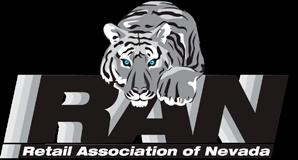




By Bryan Wachter
RETAIL AND K-12 EDUCATION ARE TWO PILLARS OF COMMUNITY life that may seem distinct but are deeply intertwined, particularly in Nevada. As the state continues to grow and diversify, the relationship between these sectors becomes increasingly significant. Retailers not only contribute to the local economy but also play a crucial role in supporting education, which in turn cultivates the future workforce necessary for sustaining and advancing the retail industry. Understanding this symbiotic relationship can help stakeholders leverage their positions to foster a thriving community.
CONTRIBUTIONS AND EMPLOYMENT OPPORTUNITIES
The retail sector is a major economic driver in Nevada, generating substantial revenue and providing numerous employment opportunities. According to the Retail

Bryan Wachter
Association of Nevada, the state’s retail industry employs thousands, ranging from entry-level positions to management roles. These jobs are vital for the local economy, offering employment to individuals from various educational backgrounds, including recent high school graduates.
For many young Nevadans, their first job is often in retail. These entry-level positions offer more than just a paycheck; they provide essential skills such as customer service, time management, and teamwork. These experiences are foundational, helping
students and young adults develop a strong work ethic and practical skills that will benefit them throughout their careers, regardless of the industry they choose to pursue.
Retail businesses in Nevada recognize the importance of a well-educated population and have actively contributed to the enhancement of K-12 education. Many retailers engage in partnerships with local schools, providing funding, resources, and support
Continued from page 1 for various educational programs. This involvement ranges from sponsoring extracurricular activities and sports teams to donating supplies and technology.
For example, several large retail chains and local businesses have initiated scholarship programs and internship opportunities for high school students. These programs not only help alleviate the financial burden of higher education but also give students a taste of real-world professional environments. By investing in the education of their future employees, retailers ensure a more skilled and prepared workforce.
Quality K-12 education is crucial for the long-term success of the retail industry. Educated individuals are more likely to possess the critical thinking and problemsolving skills necessary for innovative and efficient retail operations. Moreover, a strong educational foundation equips future employees with the ability to adapt to the rapidly evolving retail landscape, which increasingly relies on technology and data analytics.
Furthermore, education fosters a community of informed consumers.
Students who receive a wellrounded education are better
equipped to make informed purchasing decisions, understand the economic impact of their choices, and contribute to a stable and prosperous local economy. Educated consumers are also more likely to engage in civic activities, promoting a healthy and engaged community that supports local businesses.
Retailers in Nevada understand that their success is closely linked to the well-being of the communities they serve. By investing in education, they not only support the development of their future workforce but also demonstrate social responsibility and community engagement. This investment creates a positive feedback loop; a better-educated community attracts more businesses, which in turn supports further educational initiatives. Additionally, retailers’ engagement with local schools helps build strong community ties and enhances their brand reputation.
Consumers are more likely to support businesses that show a genuine commitment to improving their communities. This goodwill can translate into increased customer loyalty and a stronger local customer base.
Despite the clear benefits, there are challenges to the relationship between retail and K-12 education. Funding constraints and resource limitations in public education systems can hinder the effectiveness of retailer contributions. Additionally, aligning the goals of educational institutions with the needs of the retail sector requires ongoing communication and collaboration.

However, these challenges also present opportunities. Retailers can work with educational policymakers to advocate for better funding and more comprehensive educational programs that include career readiness and vocational training. Collaborative efforts can lead to innovative solutions, such as creating specialized training programs that prepare students for specific roles
within the retail industry. The relationship between retail and K-12 education in Nevada is a dynamic and mutually beneficial one. Retailers play a vital role in supporting education through funding, resources, and real-world opportunities, while a strong educational system ensures a skilled and capable workforce. By continuing to foster this relationship, Nevada can build a more robust economy and a brighter future for its residents. Engaging in this symbiotic partnership not only benefits the immediate stakeholders but also strengthens the community as a whole, paving the way for sustainable growth and prosperity. ■
By Liz MacMenamin
THE PHARMACY INDUSTRY
PLAYS A VITAL ROLE in maintaining public health, providing essential medications, and offering valuable health advice to the community. However, there is an increasing demand for qualified pharmacy workers, a challenge that can be met through strategic educational initiatives. As our community grows, the need for more pharmacy professionals becomes evident, highlighting the critical intersection between education and the pharmacy sector.
The healthcare landscape is evolving, with an aging population and the increasing prevalence of chronic diseases driving the demand for more pharmacy services. Pharmacies are not only places where medications are dispensed but also centers for health management and
education. Pharmacists and pharmacy technicians provide crucial services such as immunizations, health screenings, and counseling on medication management. The COVID-19 pandemic further underscored the importance of pharmacies in public health, as they became pivotal points for testing and vaccination efforts.
Despite the growing need, many communities face a shortage of pharmacy professionals.
According to the Bureau of Labor Statistics, Nevada’s employment in the pharmacy sector is expected to grow from 2,810 positions in 2020 to 3,240 by 2030, a 15.30% increase. This growth rate significantly outpaces the national average, which is projected to increase by only 2.35% over the same period. Nevada will need to fill approximately 160 pharmacy-related job openings annually, highlighting the urgent need for a well-educated workforce to meet this demand.

Education is the cornerstone of developing a robust pharmacy workforce. By investing in comprehensive pharmacy education programs, we can ensure a steady pipeline of qualified professionals ready to enter the field. These programs need to encompass a range of training levels, from pharmacy technicians to advanced clinical pharmacists.
and Awareness: Introducing pharmacy
career pathways at the high school level can spark an early interest in the field. Career fairs, workshops, and partnerships with local pharmacies can help students understand the opportunities within the pharmacy sector. Programs that offer dual enrollment or early college credits in pharmacy-related courses can also give students a head start.
and Technical Programs: Community colleges and technical schools play a crucial role in training pharmacy technicians. These programs should be supported and expanded to include up-to-date curricula that reflect the latest advancements in pharmacy practice. Offering flexible schedules and financial aid can make these programs more accessible to a diverse student population.
3. University-Level Pharmacy Education: Universities offering Doctor of Pharmacy (PharmD) programs
Nevada Congresswoman Susie Lee joins retail leaders to address the increasing trend of costly theft in stores, highlighting concerns over organized retail crime. With items like cotton balls
now locked up due to theft concerns, Lee advocates for the Combating Organized Retail Crime Act to hinder thieves and prevent the sale of stolen goods, gaining support from both parties. Bryan Wachter of the Retail Association of Nevada emphasizes the threat to employee safety posed by these crimes, while national retailers like The Home Depot
acknowledge the rising challenge of organized retail crime, which cost stores over $112 billion in losses in 2022.
A retail theft sting con-

ducted by the Sparks Police Department in partnership with Target resulted in the arrest of 12 individuals, with Continued on page 5
are essential in training the next generation of pharmacists. These programs should emphasize both clinical and community pharmacy practice, preparing students for a variety of roles within the industry. Additionally, universities can develop accelerated programs and provide ample clinical rotation opportunities to ensure that graduates are wellprepared for the workforce.
The pharmacy field is constantly evolving, requiring ongoing education and professional development for current practitioners. Continuing education programs should be readily available to help pharmacists and technicians stay current with the latest practices, regulations, and technological advancements.
Effective collaboration between educational institutions and the pharmacy industry is key to addressing workforce needs. Partnerships can provide students with real-world experience through internships, co-op programs, and mentorship opportunities. Pharmacies can offer scholarships, sponsor educational programs, and participate in advisory boards to help shape curricula that meet industry standards.
Additionally, pharmacies can work with educational institutions to develop specialized training programs that focus on high-demand areas such as geriatric pharmacy, chronic disease management, and immunization services. By aligning educational outcomes with industry
needs, we can ensure that graduates are wellprepared to meet the demands of the modern pharmacy environment.
A well-educated pharmacy workforce has a direct impact on community health. Pharmacists and pharmacy technicians are often the most accessible healthcare professionals, providing critical services that contribute to better health outcomes. They play a vital role in medication adherence, chronic disease management, and preventive care. Increasing the number of qualified pharmacy workers ensures that community pharmacies can operate efficiently, reducing wait times and enhancing the patient experience.
Continued from page 3
It also allows for the expansion of services, such as in-pharmacy clinics and health education programs, further integrating pharmacies into the broader healthcare system.
The intersection of education and the pharmacy industry is crucial for addressing the growing demand for pharmacy workers in our community. By investing in comprehensive and accessible educational programs, we can develop a skilled workforce ready to meet the healthcare needs of the public. Collaboration between educational institutions and the pharmacy industry is essential to ensure that training programs align with real-world demands. Through these efforts, we can enhance community health, support the pharmacy sector, and build a sustainable future for healthcare delivery. ■
By Liz MacMenamin
CONDUCTED A workshop on Wednesday, May 29th in Las Vegas, Nevada. These seven appointed regulators are proposing to amend the language in the law to regulate staffing standards in pharmacies. These new regulations would have an extremely negative impact on this sector of the health care industry.
Each individual testifying was given three minutes to educate these regulators on the impact this would have on patients and the community pharmacy in Nevada. There were varied concerns regarding this language testified to at this hearing. Pharmacists as well as community pharmacy representatives testified in opposition to
the proposed regulation. There was no testimony in support of these changes at this hearing. However, there was testimony regarding the impact this language would have on delivering access to medication for patients in Nevada.
Even with no supporting testimony, six board members supported moving forward with the proposed language. The public member of the board went as far as to totally demonize the community pharmacy on the record, with no regard to the impact his tirade would have on public perception of an entire health care industry.
These regulations do not take into consideration the current health care labor shortages, especially for pharmacists and pharmacy technicians in
seven released with citations. In addition to theft charges, some face arrest for drug-related offenses, including possession of methamphetamine and drug paraphernalia. The operation highlights efforts to combat both retail theft and drug-related crimes in the area. KOLO
Philadelphia Police Department announces the dismantling of a large retail theft crew involving at least nine individuals, including children as young as nine
Nevada. This language proposed would also exacerbate pressures on current staffing and potentially compromise patient safety and your ability to obtain medications in a timely manner.
These regulators had no conversation with the businesses involved in crafting this language. RAN has voiced our concern regarding closures of pharmacies in economically disadvantaged areas as there would be no way that these pharmacies would be able to comply with the proposed requirements.
In summary, granting community pharmacies the flexibility to determine their staffing levels ensures better patient care, responsiveness to demand fluctuations,
Continued from page 4
years old, used to commit crimes. Two women, Janiyah Robinson and Ayonna Robinson, are arrested, with Janiyah identified as the ringleader. The crew targeted high-end stores in Philadelphia and surrounding areas, stealing thousands of dollars worth of merchandise.
and overall business viability. Regulators should consider these factors when evaluating prescription limits to avoid unintended consequences for patient access to essential medications. You, as a patient and as a business owner, should be genuinely concerned that these unelected individuals could impact your and your employees’ ability to have timely access to medications in our state.
As a business owner, RAN would recommend that you reach out to Governor Lombardo and your elected officials to discuss this regulatory overreach in Nevada. If the state can decide that they know better about how to staff and run a pharmacy than the owners of the business, your business could be next. ■
Police link the group to multiple robberies, totaling at least $75,000 in losses for area businesses. The bust highlights the concerning trend of organized retail thefts involving minors, prompting increased vigilance from law enforcement.
NBC Philadelphia
Nevada saw a surge in voter registrations in May, adding over 14,000 new voters ahead of upcoming primary and general elections. According to Secretary of State Cisco Aguilar, Republicans outgain Democrats in new registrations, with the majority registering as nonpartisan. The total number of active registered voters in the state rises to nearly 2 million, reflecting a diverse political landscape as the election season approaches.
Las Vegas Sun
Nevada parents will have to wait until September to receive benefits from the new Summer Electronic Benefits Transfer program, which provides $40 per eligible child per month for summer food assistance. Delays are due to the Nevada Division of Welfare and Supportive Services needing state funding approval to cover administrative costs. The program, largely federally funded, will distribute benefits to households already participating in other income-based assistance programs and those eligible for free and reduced lunch.
Nevada Current
The Nevada Supreme Court has rejected a ballot referendum seeking to overturn a $380 million public financing deal for a proposed $1.5 billion stadium to relocate the Oakland Athletics to Las Vegas. The decision, issued just 44 days before the petition signature deadline, upheld a lower court ruling that found the language of the proposed referendum to be legally deficient and misleading. While the court split in its decision, with five justices affirming the lower court’s order, one dissenting, and another partially concurring, the rejection deals a blow to the efforts of the Schools Over Stadiums political action committee. Despite the setback, the group vows to continue its fight against the financing deal, indicating plans to refile the petition for the 2026 ballot.
Nevada Independent
The Southern Nevada Public Land Management Act (SNPLMA) is poised to inject $348 million into Nevada’s conservation and park enhancement efforts, soliciting public input for proposed projects aimed at diverse initiatives. Since its
inception in 1998, SNPLMA has channeled over $4 billion from Las Vegas area land sales towards conservation, wildfire prevention, and park improvements statewide. Proposed projects include renovating parks, reconstructing campgrounds, enhancing wildlife habitat, and implementing wildfire mitigation measures. Notable initiatives encompass expanding city parks, upgrading recreational facilities, and protecting endangered species like the Mojave Desert tortoise. Additionally, funds will support wildlife monitoring programs, habitat restoration for Bonneville cutthroat trout, and efforts to combat illegal roads and off-roading impacts. This allocation presents a significant opportunity to bolster Nevada’s environmental stewardship and outdoor recreation infrastructure while addressing critical conservation challenges.
Nevada Independent
At a sweltering rally in Las Vegas, Republican presidential candidate Donald Trump pledged to eliminate taxation on income from tips, directly appealing to service workers in Nevada. Trump promised immediate action upon taking office and proposed legislation
in Congress to enact the change. This announcement adds detail to Trump’s tax plan, which includes making permanent the Republicanpassed individual tax cuts of 2017. However, experts caution that such moves could significantly increase deficits by some $4 trillion over a decade versus current forecasts. Meanwhile, Trump continued to rally his supporters, valorizing those involved in the January 6 Capitol attack and criticizing President Biden’s immigration policies. With Nevada being a key swing state, Trump’s promises and rhetoric underscore his efforts to secure crucial support in the upcoming election.
Reuters
Authorities in Nevada are cautioning drivers to be vigilant after Mormon cricket “sludge” caused multiple crashes over the weekend.
The unsettling mixture, formed from recent rain and crushed crickets, made roads extremely slick, contributing to accidents involving semitrucks on Interstate 80. While no serious injuries were reported, officials warned of the unpredictable road conditions. Mormon crickets, known for swarming towns across the state, pose no direct harm to
With the summer solstice approaching, grocers are ramping up efforts to attract consumers’ attention and compete for their grocery spending. Meijer and Shipt launch a summer grilling sweepstakes, while Aldi slashes prices on over 250 items and Target focuses on food discounts. Publix introduces seasonal ice cream flavors and other summer delights, while Hannaford offers freshly prepared lobster rolls. Walmart joins in with a budget-friendly summer cookout basket. Grocers are pulling out all the stops to provide savings and seasonal treats to hungry consumers. Grocery Dive
Walmart announces plans to implement electronic shelf
labels (ESLs) in 2,300 stores by 2026, aiming to enhance efficiency and customer service. This decision follows a successful test at a Texas supercenter, signaling a significant expansion of ESLs in U.S. grocery retail, where adoption has been limited. The shift from paper tags to ESLs will reduce workers’ time to update prices from two days to just a few minutes. Moreover, associates will use lights on the tags to identify shelves that need restocking. Grocery Dive
Walgreens announces price cuts on 1,300 items, responding to ongoing consumer spending fatigue amid elevated inflation rates. The pharmacy chain’s move aims to alleviate financial strain for customers, reflecting a broader trend of retailers pivoting to value offerings. This comes as the post-pandemic
economic recovery shows signs of a ‘K’-shaped split, with higher-income consumers maintaining spending while lower-income groups cut back. Meanwhile, other sectors like travel continue to see resilience despite economic uncertainties CNBC
Amazon deploys the AI model “Project P.I.” to scan millions of products daily, detecting defects before shipment to ensure customer satisfaction and reduce environmental impact. Using a combination of generative AI and computer vision technologies, Project P.I. identifies issues like damaged items, aiding in preventive measures and sustainability efforts. By preventing imperfect products from reaching customers, Amazon enhances the customer experience and
minimizes carbon emissions from returns. The technology also assists selling partners, promoting a more sustainable and efficient supply chain.
Amazon
Best Buy partners with omnichannel solutions provider Lucky to integrate store inventory with direct-toconsumer (DTC) electronics websites, offering customers real-time product availability and access to same-day delivery and in-store pickup options. The collaboration aims to meet the growing demand for seamless shopping experiences and boost consumer electronics sales. Best Buy also strategically partnered with Microsoft to enhance customer service and expand its product offerings in a competitive retail landscape. Chain Store Age
Continued on page 11
ARTIFICIAL INTELLIGENCE
(AI) IS REVOLUTIONIZING numerous sectors, and education is no exception. The integration of AI in K-12 education has the potential to enhance learning experiences, personalize education, and equip students with the skills
necessary for future careers. Retailers, in particular, should take note of these advancements, as the future of retail is closely intertwined with the evolution of education. By understanding the impact of AI on education, retail members can better prepare for a future that increasingly relies on a tech-savvy, adaptable workforce.
As AI continues to permeate various industries, including retail, it is essential to equip students with the skills necessary to thrive in a technology-driven world. AI in education not only improves learning experiences
but also introduces students to advanced technologies and fosters digital literacy. By integrating AI-based tools and platforms into the classroom, students become familiar with technologies that are increasingly prevalent in the workforce.
In the retail industry, AI
SLOWER GROWTH AND ECONOMIC UNCERTAINTY
Despite slower job and wage gains and high interest rates, consumers remain willing to spend, according to National Retail Federation (NRF) Chief Economist Jack Kleinhenz. The U.S. economy is expected to grow by 2.3% in 2023, with employment increasing by an average of 180,000 jobs per month. Inflation is projected to drop to 2.2% by year-end, nearing the Federal Reserve’s target. Strong immigration has bolstered the labor market, easing wage-driven inflation and sustaining consumer spending. Core retail sales rose 3.8% year-over-year for the first four months, aligning with NRF’s 2024 retail sales growth forecast of 2.5%-3.5%.
National Retail Federation
DECISION ON FIRST AMENDMENT
The Retail Litigation Center (RLC) has filed an amicus brief with the United States Court of Appeals for the Eight Circuit, urging the court to overturn a National Labor Relations Board (NLRB) decision regarding The Home Depot’s uniform policy. The NLRB ruled that Home Depot improperly enforced a uniform policy prohibiting store associates from displaying religious, political, or social messages
on their work aprons. The RLC argues that retailers have the right to create a neutral shopping environment and that the First Amendment protects their choice to refrain from political or social messaging. They contend that the National Labor Relations Act supports employer restrictions on messages that could harm customer relations or public image.
Retail Industry Leaders Association
Jennifer Hatcher, Chief Public Policy Officer of FMI – The Food Industry Association, emphasized the pressing need for legislative intervention to alleviate cost pressures facing the food industry. Speaking in response to the U.S. Senate Committee on Banking, Housing, and Urban Affairs Subcommittee on Economic Policy’s hearing, Hatcher highlighted the significant burden of swipe fees for credit card payments, which averaged 2-4% per transaction, amounting to over $1,100 annually for American households. Additionally, she underscored the challenges posed by retroactive fees imposed by Pharmacy Benefit Managers (PBMs) on every prescription, urging policymakers to pass the bipartisan Credit Card Competition Act and address anticompetitive
PBM practices. Despite these challenges, Hatcher expressed optimism regarding recent Consumer Price Index numbers, indicating progress in food price inflation, offering relief to grocery shoppers, and underscoring the industry’s commitment to mitigating high inflation through consumer engagement and partnership. FMI – The Food Industry Association
In response to inquiries from the U.S. Department of Justice, Department of Health and Human Services, and Federal Trade Commission, the National Association of Chain Drug Stores (NACDS) is urging for decisive action to address concerning practices of pharmacy benefit managers (PBMs). NACDS President and CEO Steven C. Anderson outlined various issues caused by PBMs, including below-cost reimbursement to pharmacies and patient steering, emphasizing the detrimental effects on patient access, healthcare costs, and pharmacy sustainability. Urging prioritization of PBM reform, Anderson called upon both federal agencies and Congress to take swift action in creating a fairer and more competitive healthcare landscape.
National Association of Chain Drug Stores
The National Association of Chain Drug Stores (NACDS) emphasized the pivotal role of pharmacies and pharmacists in driving Food is Medicine initiatives and providing comprehensive wellness solutions during a recent U.S. Senate Committee hearing. NACDS highlighted pharmacists’ accessibility and clinical expertise, underlining their potential to improve healthcare access, innovate solutions, and reduce preventable spending associated with suboptimal health outcomes. Supported by a Morning Consult poll, NACDS showcased strong public backing for pharmacist involvement in nutritional guidance and chronic disease prevention. The organization also cited pharmacy interventions’ significant impact during the COVID-19 pandemic and ongoing projects like the Nourish My Health campaign and a partnership with the Milken Institute aimed at expanding food intervention accessibility through pharmacies. All these emphasized pharmacies’ capacity to address evolving healthcare needs and promote wellness nationwide. National Association of Chain Drug Stores
is used for applications such as inventory management, customer service, and sales forecasting. A workforce well-versed in AI and related technologies will be better prepared to navigate and excel in such a dynamic industry. Retailers stand to benefit from a talent pool that is adept at leveraging AI to enhance operational efficiency, improve customer experiences, and drive innovation.
AI-driven education not only equips future employees with technical skills but also fosters critical thinking, problem-solving, and analytical abilities. These skills are invaluable in the retail sector, where understanding customer behavior, predicting trends, and personalizing the shopping experience are key to success. Retailers who employ individuals with these capabilities can better anticipate customer needs, tailor their offerings, and create a more engaging shopping environment.
Moreover, as AI technologies become more integrated into retail operations, employees who are comfortable and proficient with these tools can significantly enhance the customer experience. For instance, AI-powered chatbots and virtual assistants can provide personalized customer support, while data analytics can help in creating targeted marketing campaigns.
Educated employees who understand how to harness these technologies will be instrumental in driving customer satisfaction and loyalty.
AI can also play a crucial role in aligning educational curricula with industry needs. Retailers can collaborate with educational institutions to develop AIdriven training programs and courses that address specific skills gaps in the workforce. These programs can be tailored to teach students the technical skills and knowledge required in the retail sector, such as data analysis, machine learning, and customer relationship management. By fostering such collaborations, AI helps bridge the gap between education and retail, ensuring that students are equipped with relevant skills that enhance their employability. This alignment benefits both students and retailers, as it creates a pipeline of qualified candidates who can contribute to the industry’s growth and innovation. Retailers who invest in educational initiatives and partnerships demonstrate a commitment to community development and workforce preparedness.

AI in education can also stimulate innovation and creativity among students, qualities that are essential for the retail industry’s evolution. AI-powered tools, such as virtual labs and simulation platforms, provide interactive and immersive learning experiences that encourage experimentation and exploration. These tools enable students to engage with complex concepts in a handson manner, fostering a deeper understanding and sparking creative problem-solving.
In the retail industry, innovation and creativity are critical for staying competitive and meeting evolving consumer demands. By nurturing these qualities in students, AI-driven education prepares them to contribute innovative ideas and solutions in their future retail careers. This innovative mindset is crucial for driving the retail industry forward, whether through developing new products, improving customer experiences, or optimizing operations.
Retailers are an integral part of the communities they serve, and supporting AI in education contributes to building a
Continued from page 7
tech-savvy community. As students become proficient in AI and related technologies, the overall digital literacy of the community improves. This techsavvy community is more likely to engage with and support retailers that leverage advanced technologies, creating a positive feedback loop that benefits both the retail sector and the community at large.
By understanding and supporting the integration of AI in education, retailers can play a significant role in fostering a community that is prepared for the future. This investment in education not only benefits the immediate stakeholders but also strengthens the community as a whole, paving the way for sustainable growth and prosperity.
The integration of AI in education holds tremendous promise for enhancing learning experiences, improving educational outcomes, and preparing students for the future workforce. For the retail industry, this evolution in education is particularly significant. A well-educated, tech-savvy workforce is essential for leveraging AI and other advanced technologies to drive innovation and growth. By embracing AI in education, retailers can ensure they have access to a skilled and adaptable workforce, ultimately benefiting their businesses and the communities they serve. Engaging in this symbiotic partnership not only supports the future of education but also secures a prosperous future for the retail industry. ■
NRS requires all existing members of a self-insured group to be notified of all new members. NRNSIG new members are listed below.
NRNSIG members who wish to register a negative vote on a new group member, please write NRNSIG at 575 S. Saliman Road, Carson City, NV 89701, indicating which member and the reason(s) for the negative vote.

humans but have been a nuisance in northern Nevada communities. With outbreaks typically lasting 4 to 6 years, efforts are underway to manage their populations, which can threaten agriculture and road safety.
NBC News
Washoe County prosecutors have taken legal action against the U.S. Postal Service, filing a lawsuit to block its plan to shift key mail processing operations from Reno to Sacramento. Alleging violations of federal law due to the absence
Continued from page 6
of an advisory opinion from the Postal Regulatory Commission, prosecutors contend that the move—part of the Postal Service’s 10-year transformation plan—could result in nationwide mail delays. Despite previous rulings, the lawsuit seeks to halt further action until the commission provides an opinion. The contentious move has drawn bipartisan opposition, with concerns raised over its impact on the region’s economy and mail ballots. While the Postal Service maintains that the move won’t affect incoming mail to Northern Nevada, critics argue that unpredictable winter weather on Interstate 80 and Donner Pass could lead to significant
Continued from page 7
delays in mail delivery, potentially affecting federal elections.
Northern Nevada Business Weekly
Assembly Speaker Steven Yeager aims to elevate Nevada’s K-12 education funding to the national average within a decade, signaling a renewed focus on education spending despite recent increases. With Nevada consistently ranking low in per-pupil spending, Yeager highlights the pressing need to bridge the gap by emphasizing the role of the Commission
According to the National Retail Federation (NRF), retail sales experienced a significant uptick in May, marking the largest month-over-month increase in over a year. Total retail sales, excluding automobiles and gasoline, saw a 1.35% rise compared to April, with a year-over-year increase of 3.03%. Core retail sales, excluding additional sectors, also surged by 1.2% monthover-month and 2.88% yearover-year. NRF President and CEO Matthew Shay attributes this growth to a robust job market and real wage gains,
with online sales, health, personal care, and clothing sectors notably thriving. Despite certain sectors facing declines, the overall trend underscores continued consumer spending and confidence amidst economic recovery.
Chain Store Age
Walmart unveiled new training programs aimed at addressing the shortage of skilled trade workers, including pharmacy and HVAC technicians, among its store
and warehouse employees. The nation’s largest private employer aims to fill these high-demand roles through initiatives designed to upskill its workforce. One such program, piloted in the Dallas area, offers employees the opportunity to pursue careers in skilled trades . CNBC
As smartphone usage for shopping and dining soars, reliable connectivity is crucial for enhancing customer experiences. While Wi-Fi offers many benefits, it
on School Funding in assessing Nevada’s position. Achieving this goal could be expedited if Democrats secure super majorities in the 2025 Legislature, granting them veto-proof power. Yeager also addresses accountability in education spending and explores the prospect of breaking up the Clark County School District, acknowledging the complexities involved. Additionally, he highlights mental health reform as a bipartisan priority, emphasizing the importance of expanding services and infrastructure, particularly in telehealth, to address the growing mental health crisis exacerbated by the pandemic. Nevada Appeal
often falls short in retail and restaurant environments due to cumbersome login processes and security concerns. Stephen Kowal of Nextivity suggests cellular signal boosters as a superior alternative, providing seamless and secure connectivity essential for modern “phygital” experiences. With mobile payments and app-based services becoming more prevalent, businesses must ensure robust connectivity to stay competitive and meet evolving consumer expectations. Forbes
Mary F. Lau President/CEO
Bryan Wachter Senior Vice President
Elizabeth MacMenamin Vice President of Government Affairs
Piper Brown Vice President, Finance and Administration
Megan Bedera
